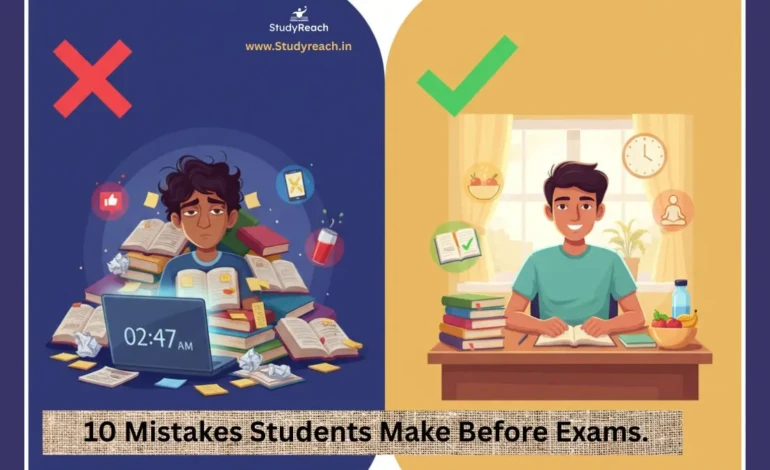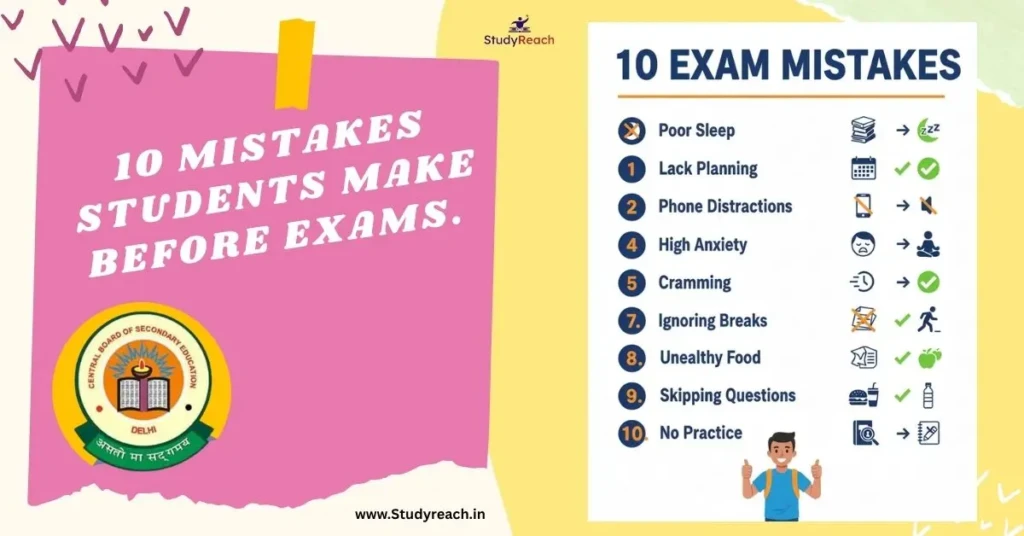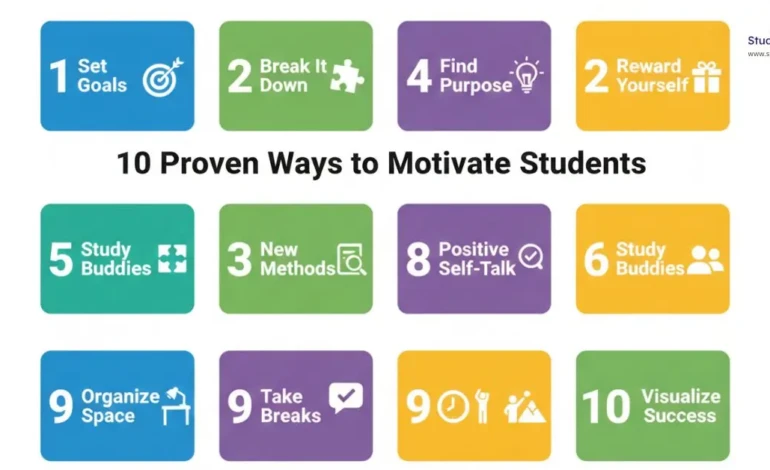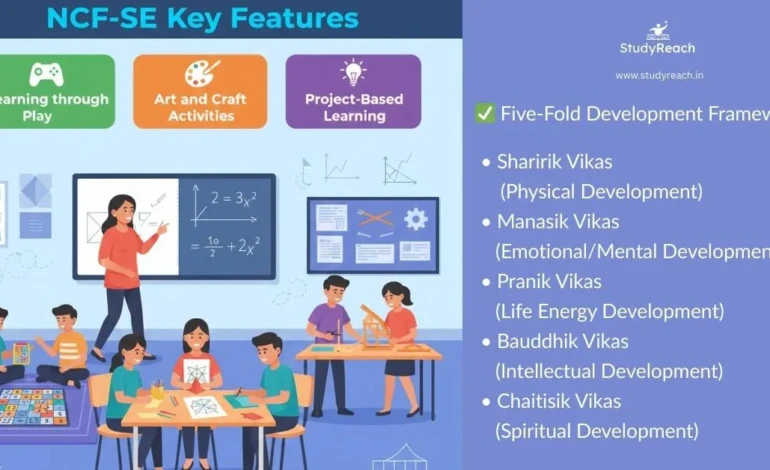
10 Mistakes Students Make Before Exams (And How to Avoid Them)
Article Summary
Exams can be stressful, but many students unintentionally undermine their own performance by committing mistakes that can be prevented. This thorough guide identifies the ten most typical exam-related errors made by students, ranging from last-minute cramming to neglecting self-care. You’ll learn useful, doable tactics to steer clear of these problems and improve your exam score. These tips will give you a clear and confident approach to exam season, whether you’re studying for board exams, competitive exams, or semester finals.
Table of Contents
Introduction
Hey there, future exam champion! Let’s talk real for a moment. You’ve spent months in class, taken notes, and now the big day is approaching. But here’s the truth bomb—most students don’t fail exams because they don’t know the material. They fail because of what they do (or don’t do) in the weeks leading up to exam day.
I’ve witnessed innumerable intelligent students stumble—not because they lacked intelligence, but rather because they fell into typical pitfalls that were entirely preventable. Consider this essay to be your helpful warning system, similar to having an older sibling who has experienced everything and wishes to spare you the same headaches.
Ready to discover what NOT to do? Let’s dive into the 10 biggest mistakes students make before exams and, more importantly, how you can steer clear of them.
10 Critical Mistakes Students Make Before Exams
1. Cramming Everything the Night Before
This is the granddaddy of all exam mistakes. You know the scene—it’s 11 PM the night before your exam, you’re chugging energy drinks, and desperately trying to memorize an entire semester’s worth of material.
Why It Fails: Your brain needs time to process and store information in long-term memory. Cramming might help you recall facts for a few hours, but by exam time, your exhausted mind will draw blanks.
Smart Solution:
- Start studying at least 2-3 weeks before exams
- Use the “spaced repetition” technique—review material multiple times over days
- Study in 45-minute chunks with 10-minute breaks
- Get 7-8 hours of sleep the night before
“I used to pull all-nighters before every exam. The day I switched to studying for 2 hours daily over two weeks, my grades jumped from B’s to A’s. Sleep matters more than that extra hour of panic studying!” – Priya, Class 12 Student
2. Ignoring Past Papers and Sample Questions
Many students focus only on reading notes and textbooks, never actually practicing with real exam-style questions. This is like learning to drive by reading the manual but never sitting behind the wheel!
Why It Fails: Exams test your ability to apply knowledge under time pressure, not just memorize facts. Without practice, you’ll struggle with timing and question formats.
Smart Solution:
- Solve at least 5-10 past year papers
- Time yourself while practicing
- Analyze marking schemes to understand what examiners want
- Identify question patterns and frequently asked topics
3. Studying Without a Plan
Opening your book randomly and hoping for the best? That’s not studying—that’s wishing. Without a clear plan, you’ll waste time on topics you already know while neglecting weak areas.
Why It Fails: Lack of direction leads to inefficiency, anxiety, and incomplete coverage of the syllabus.
Smart Solution:
Create a study timetable that includes:
| Week | Focus Areas | Daily Hours | Review Day |
| Week 1 | Difficult subjects (Math, Science) | 3-4 hours | Sunday |
| Week 2 | Medium difficulty topics | 3 hours | Sunday |
| Week 3 | Easy subjects + Revision | 4 hours | Sunday |
| Last 3 Days | Complete syllabus revision + Past papers | 5-6 hours | Daily quick review |
4. Multitasking While Studying
Checking Instagram between pages? Replying to WhatsApp messages while solving problems? Your brain isn’t designed to focus on multiple things simultaneously—it’s just rapidly switching between tasks, which kills productivity.
Why It Fails: Studies show multitasking can reduce productivity by up to 40% and decrease retention significantly.
Smart Solution:
- Put your phone in another room or use app blockers
- Create a distraction-free study zone
- Use the Pomodoro Technique: 25 minutes focused study, 5 minutes break
- Tell family/friends about your study schedule so they don’t disturb you

5. Neglecting Physical Health and Sleep
Skipping meals, surviving on junk food, and sleeping just 4-5 hours might seem like sacrifices for success, but they’re actually setting you up for failure.
Why It Fails: Your brain needs proper nutrition, hydration, and rest to function optimally. Poor sleep impairs memory consolidation and cognitive performance.
Smart Solution:
- Sleep 7-8 hours every night (non-negotiable!)
- Eat brain-boosting foods: nuts, fruits, eggs, fish
- Stay hydrated—drink 8-10 glasses of water daily
- Exercise for 20-30 minutes daily (even a walk helps)
- Avoid heavy meals and excessive caffeine before sleep
Quick Nutrition Checklist:
- ✓ Breakfast: Eggs/oatmeal + fruit
- ✓ Lunch: Balanced meal with protein + vegetables
- ✓ Snacks: Nuts, fruits, yogurt (not chips!)
- ✓ Dinner: Light and at least 2 hours before sleep
6. Studying Alone When You Need Help
Pride can be a dangerous thing. Many students struggle with difficult topics but never ask for help, thinking they should figure it out themselves.
Why It Fails: You waste hours being confused when a 10-minute explanation from someone who understands could clear everything up.
Smart Solution:
- Form study groups with serious students
- Don’t hesitate to ask teachers for clarification
- Use online resources: Khan Academy, YouTube tutorials, educational apps
- Teach concepts to friends—teaching solidifies your own understanding
- Join online study communities for doubt resolution
7. Focusing Only on Memorization, Not Understanding
Rattafication (rote learning) might help you pass, but it won’t help you score well or retain knowledge for future use.
Why It Fails: Exam questions increasingly test conceptual understanding and application, not just recall. If the question is worded differently, you’re stuck.
Smart Solution:
- Ask yourself “Why?” and “How?” for every concept
- Create mind maps connecting related ideas
- Explain concepts in your own words
- Use real-life examples to understand abstract ideas
- Practice application-based questions
Think of studying like building with LEGO blocks. Memorization is like taking a photo of the completed structure. Understanding is like knowing how each block connects—so you can build it yourself, even if you forget what it looks like.
8. Leaving Weak Topics for Later
“I’ll study that difficult chapter later” is the most dangerous lie students tell themselves. Guess what? “Later” never comes, or comes too late.
Why It Fails: Weak topics require more time and effort. Leaving them to the end means you’ll either skip them or panic-study them poorly.
Smart Solution:
- Tackle difficult subjects FIRST when your energy is highest
- Break challenging chapters into smaller sub-topics
- Use the “2-minute rule”: If starting feels hard, commit to just 2 minutes
- Reward yourself after completing tough topics
- Don’t aim for perfection—aim for understanding the basics first
9. Ignoring Exam Instructions and Paper Patterns
You’d be surprised how many students lose marks not because they don’t know answers, but because they didn’t read instructions carefully or didn’t understand the paper pattern.
Why It Fails: Wrong question numbering, exceeding word limits, or misunderstanding what’s being asked can cost you precious marks.
Smart Solution:
- Study the exam blueprint/paper pattern thoroughly
- Understand marking schemes (which questions carry more marks?)
- Read instructions 2-3 times before starting the paper
- In the exam, spend the first 5 minutes reading the entire paper
- Underline keywords in questions: “explain,” “list,” “compare,” etc.
Common Instruction Mistakes:
- Not attempting the required number of questions
- Writing answers in the wrong section
- Exceeding word limits (yes, you can lose marks for this!)
- Not showing workings in math/science problems
10. Letting Stress and Anxiety Take Over
A little stress can motivate you, but excessive anxiety paralyzes your ability to think clearly and perform well.
Why It Fails: When you’re consumed by worry, your brain’s fight-or-flight response kicks in, making it difficult to access memory and think rationally.
Smart Solution:
- Practice deep breathing: 4 counts in, hold 4, out 4
- Use positive affirmations: “I am prepared. I can handle this.”
- Visualize success—imagine yourself calmly solving questions
- Take regular breaks during study sessions
- Talk to someone you trust about your fears
- Remember: Exams test preparation, not your worth as a person
Quick Stress-Relief Techniques:
- 5-minute meditation using apps like Headspace
- Progressive muscle relaxation
- Listen to calming music
- Take a short walk outside
- Practice gratitude—write 3 things you’re grateful for daily
Bonus Tips to Boost Exam Performance – Mistakes Students Make Before Exams
Now that you know what NOT to do, here are some extra winning strategies:
Smart Revision Techniques:
- Active Recall: Close your book and write everything you remember
- Feynman Technique: Explain concepts as if teaching a 10-year-old
- Color Coding: Use different colors for different types of information
- Mnemonics: Create acronyms and memory tricks for lists
- Recording: Record yourself explaining topics and listen during commutes
On Exam Day:
- Arrive 20-30 minutes early (not too early to get anxious!)
- Bring extra pens, pencils, calculator, admit card, ID
- Attempt easiest questions first to build confidence
- Manage time: allocate time per question based on marks
- Review your answers if time permits
Conclusion
Listen, mistakes are part of learning, but you don’t have to learn every lesson the hard way. By avoiding these 10 common pitfalls—cramming, poor planning, neglecting health, studying in isolation, and letting stress win—you’re already ahead of most students.
Remember, exam success isn’t about being the smartest person in the room. It’s about being strategic, consistent, and taking care of yourself throughout the process. You’ve got this!
Your future self will thank you for the smart choices you make today. Now close this article, create that study plan, and let’s ace those exams together!
Need more study tips and motivation? Visit studyreach.in for resources, strategies, and support throughout your academic journey.
Related Article : Top 10 mistakes to avoid while preparing for CBSE Board Exam 2024
This article is part of our CBSE 2025 Education Series, designed to help students, teachers, and parents understand the major reforms introduced by CBSE
Q1: How many hours should I study before exams?
Quality matters more than quantity. Aim for 3-4 focused hours daily for 2-3 weeks before exams rather than 10-hour marathon sessions. Take regular breaks and ensure 7-8 hours of sleep. Exhausted studying is ineffective studying.
Q2: Is it okay to take a complete day off during exam preparation?
Absolutely! Taking one day off per week helps prevent burnout and improves long-term retention. Use this day for relaxation, hobbies, or light revision—not complete disconnection from studies. Think of it as a strategic recharge, not laziness.
Q3: What should I do if I realize I’m making these mistakes just days before the exam?
Don’t panic! Prioritize ruthlessly. Focus only on high-weightage topics and concepts you partially understand (easier to strengthen than learn from scratch). Solve at least 2-3 past papers, get proper sleep, and stay calm. Partial preparation done well beats complete coverage done poorly.
Q4: How can I stay motivated when I feel like giving up during exam preparation?
Break your goal into tiny wins. Instead of “study for 4 hours,” aim for “complete 10 pages” or “solve 5 problems.” Reward yourself after each small achievement. Connect with your “why”—remind yourself why these exams matter. Talk to supportive friends or family when motivation dips.
Q5: Are group studies helpful or distracting?
It depends on the group! Study groups work when everyone is serious, focused, and committed to learning. They’re perfect for discussing difficult concepts, solving doubts, and staying accountable. However, if your group gossips more than studies, you’re better off studying alone and meeting friends separately.
















2 Comments
[…] 10 Critical Mistakes Students Make Before Exams […]
[…] 10 Mistakes Students Make Before Exams (And How to Avoid Them) […]